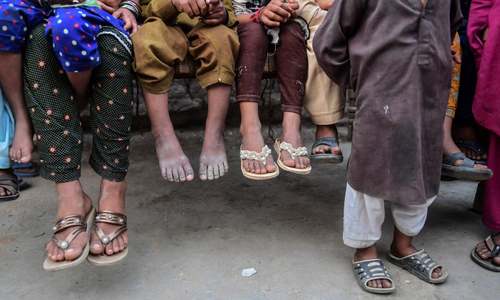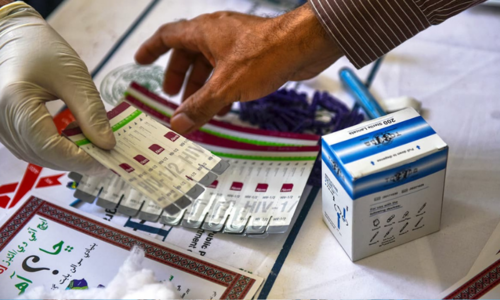KARACHI: In contrast to the remarkable progress the world has made against HIV/AIDS, Pakistan has been showing an alarming increase in infection and reported 25,000 new HIV cases last year.
The key reason for HIV spread, particularly in the general population, is the lack of infection control practices at healthcare facilities and lack of awareness in society.
These concerns were raised by experts at an event held to mark World AIDS Day on Tuesday at a local hotel.
The programme — a consultative meeting with long term survivors of HIV and launch of a risk communication and community engagement plan on safe injection practices — was organised by Bridge Consultants Foundation (BCF), a non-profit organisation currently working with the community in Ratodero, Larkana, with Unicef’s support.
80pc HIV-infected people in Pakistan are not aware of their condition
Explaining why it’s important to have infection control practices, experts said no government could eliminate a communicable disease or contain its risk, including Covid-19, without enforcing a strong mechanism of infection prevention and control.
Infection prevention and control in healthcare settings, they said, also included safe injection practices, use of personal protection equipment in patient care, cleaning and disinfection of rooms as well as proper collection and disposal of medical waste.
“But, there is no concept of infection control practices even at public sector tertiary care hospitals in our country. We have seen hospital washrooms either without water or soap while it’s common to see used syringes being thrown away in dustbins instead of separate boxes,” said Dr Sharaf Ali Shah.
Infectious medical waste was a serious threat to public health, he added.
The major reason for HIV spread/outbreaks reported in the towns of Gujrat, Sargodha in Punjab and Larkana, Sindh, in recent years, experts pointed out, was the unsafe use of injection.
“Unsafe injection practices contribute significantly to the burden of blood borne viral infections. The estimated number of infections per person per year amongst a sample of 13 low-income countries, range between 1.2 (in Tanzania and India) and 8.5 (in Pakistan) with a median 1.5,” said Waheed Khattak of BCF.
Sustainable HIV programme
Earlier, speakers informed the audience that the world had seen 52 per cent decline in new HIV cases since 1997. In 2020, there were 1.5m new HIV cases whereas 1997 had seen three million new cases.
“This progress was mainly due to effective antiretroviral drugs and enhanced HIV testing. In Pakistan, however, cases are on the rise in vulnerable groups (sex workers, transgender people and injecting drug users) as well as in the general population,” noted Dr Rafiq Khanani, President of the Infection Control Society of Pakistan.
The registered number of HIV positive persons in Pakistan, experts said was about 200,000, half of whom belonged to vulnerable groups. An estimated 4,900 children aged 1-14 were living with HIV.
“The actual number of HIV cases, however, is much higher. Studies have shown that 80pc of HIV infected persons in the country are not aware of their disease status and not on treatment, increasing vulnerability of other people in society,” said Dr Sharaf Ali Shah, adding that 25,000 new HIV cases were reported in 2020 in Pakistan.
Sharing challenges, he said the government must resume the services earlier being provided to people living with HIV, enhance testing and own the HIV programme. Currently, all medicines of the programme were being donated by the Global Fund.
Published in Dawn, December 1st, 2021














































